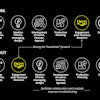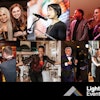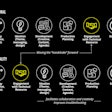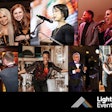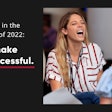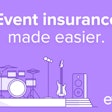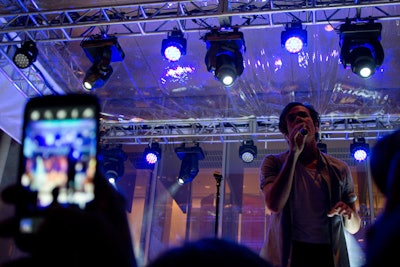
This is the second column by Chad Kaydo (@ChadKaydo), BizBash’s former editor in chief and the founder and editor of The X Letter, a website and newsletter about experiences, brands, and culture. Chad’s column appears biweekly.
You don’t need me to tell you we live in an age when new apps, gadgets, and entire classes of tech advancements promise to transform every aspect of our personal and professional lives.
There’s a tsunami of hype around trends like wearables, big data, and the “Internet of things.” And in smaller squalls, vendors who target the event and meeting space talk about how their new registration software/ticketing solution/Google Glass app will change the face of live gatherings.
Meanwhile, all too many planners are stuck using Excel spreadsheets, or just starting to marvel over using Google Docs to share information.
“It's a bit of a leap of faith to try new technology in an event,” says Matt Gunderson of Brown Bear Events. “The risk versus reward factor is difficult to weigh and everyone and their brother with a new app will tell you it is the best thing since sliced bread.”
So what would planners most like to see from event technology providers? If they could dream up any app, what would it do?
Earlier this year I conducted online surveys of more than 55 event and meeting planners and more than 25 tech executives, asking them about upcoming trends, their favorite tools, their biggest complaints, and the opportunities they see in this space. The information here is taken from those surveys.
(I’m also using the research in a report on the next tech trends for live events and experiences—you can get a copy here.)
The survey revealed several key trends in what planners want from event technology in the months and years ahead. Here’s a look.
1. Lower Prices
This is probably not something technology developers want to hear.
While the vast majority of planners surveyed said it was “very important” (42 percent) or “somewhat important” (another 42 percent) to their guests that events incorporate the latest technology, 77 percent said budgets or costs kept them from adopting new tech solutions.
The next most popular answer—resistance to change on the part of management or clients—was cited by 37 percent.
“It is expensive and isn't very reliable,” says a planner with an information services company. “If I can convince my company to spend the high cost, then it has to work perfectly.” And a media company event planner says, “Much of it is very cost-prohibitive to use; a lot of it is gimmicky and doesn't provide a real benefit or enhance the experience.”
2. Integration of Planning Tools
The explosion of event technology providers includes some for specific tasks, and others that automate larger portions of the planning process—often overlapping with other solutions. Many planners expressed frustrations over keeping up with so many options and with not being able to connect solutions designed for different tasks.
Many planners would like an all-in-one, mobile-friendly solution that manages an event’s complete life cycle, from conception to post-event reporting.
Here’s a planner for an information services company describing his dream: “I want an app that can hold all my planning information so that on site I just need to carry my phone or iPad. It would hold my rooming list (searchable by name and date), all my room diagrams, B.E.O.s [banquet event orders] (again in searchable form), audiovisual and room setup details, and finally a hotel contact list with emails so I could quickly get someone. I would like to easily be able to enter my info via an Excel spreadsheet. After the event, I could download all the updated info to my computer into a document and I could then create my final reports.”
Others want add-ons like a feature that keeps invitation lists updated and synced with contact lists in other locations.
Several tech vendors also predicted consolidation. Sam Down of Showplans says the biggest opportunity in the space is “probably the convergence of lots of different technologies that are currently available separately—e.g. event apps, planning tools, and registration offerings. If these technologies were to be synced effectively, the planning process would be 100 percent more efficient.”
Some also said in order to foster innovation, tech providers need to be more open with their platforms.
“None of them work together,” says Trace Cohen of Launch.it. “There are no public A.P.I.s [application programming interfaces]/SDKs [software development kits] and very little collaboration between event tech companies. It’s a very guarded industry with only a few big players who keep all of their information.”
3. Next-Generation Mobile Apps
There’s a vast network of event app developers: While researching The Event App Bible, Julian Solaris found more than 300 event app providers—and that was in early 2013.
But their products appear to leave planners wanting more. One agency executive says her biggest event technology complaint is “crappy event apps that don't deliver.”
When asked to name their favorite tech solutions, planners often named popular consumer apps—Uber, Seamless, Instagram—and they expect the next generation of event apps to be similarly sophisticated and simple to use.
“The first generation of mobile apps for events has automated the status quo, doing only a little more than replacing paper guides with mobile guides,” says David Owens of TapWalk. “They can do a few things paper can’t: analytics, search, social media integration. The next generation is going to be more interesting, changing rather than just automating the business and interactions at meetings, trade shows, and conventions.”
4. Seamless Social Media Integration
Using social media to amplify an event’s impact has been a popular goal in the past few years, and events have started to use these platforms to help event and conference attendees to connect with one another. Now planners are looking to see these platforms tied more directly to apps and other elements.
Rene Mark of the University of Miami says she would like to see “any form of technology that creates a more engaging experience for our clients so that they can interact from the audience, share their experience online, and engage actively with other participants.”
While event hosts often like to see content from promotional events shared widely across popular platforms, planners of employee-only corporate events or conferences focused on proprietary information would like to see tools that mimic the ease of Facebook or Twitter, but within boundaries set by the host or participants. One media company event planner says she would like “better software for creating communities around specific events or industries—something that uses existing social media profiles, but exists outside of any major platform and has strong privacy settings.”
5. Improved Internet Access
When asked to name their biggest complaint about the state of event technology, many planners and technology providers shared a common problem—what one tech entrepreneur called “horrifically crappy Wi-Fi at venues.”
Planners and tech developers say the lack of robust, reliable, reasonably priced bandwidth and network services at hotels is slowing the pace of technological advancement across meetings and events.
“Hotels and venues are impeding the adaption and exploration of digital live experiences,” says Mary Ann Pierce of MAP Digital: MetaMeetings. “The event industry should stage a revolt.”
6. Attendee Data Tracking
This is where some of the big tech trends of the moment converge.
Wireless transmitters known as beacons (or iBeacons, Apple’s version) are being used to send location-specific messages to nearby mobile phones. Near-field communication (N.F.C.) and radio frequency identification (R.F.I.D.) are catching on as ways to help guests share and store information, often related to their physical location. If wearable technology catches on, consumers will have more tools to collect and share information.
Some event hosts have started to experiment in these areas, and many are excited about the data they can collect about attendees and their behaviors during an event.
“I’d like a badge reader that does not need to be scanned by a device, meaning the whereabouts of an attendee could be tracked without having to scan at each entrance point,” says an association event planner. “Then we could figure out how much time is spent in each area, i.e., how long did they wait in line.”
This kind of tracking can help with traffic flow and security concerns, as well as adding value to attendee follow-up. “If we could capture exactly who is in the room at any given time, we could execute more targeted post-conference communications," says Maureen Ryan Fable of First Protocol.
7. Help to Figure It All Out
Many planners feel challenged just to execute events with the tools they already have and aren’t comfortable taking time to explore and test solutions that might backfire.
“It's so convoluted,” says an agency executive. “There is so much happening so fast that it's difficult to keep up. Once you learn something, it's time to learn something else.”
While you can’t blame planners for taking a wait-and-see approach, some developers say this also slows the pace of innovation.
“Many organizers are reluctant to do the work necessary to make the tech work,” says Sam Down of Showplans. “They want to use the tech and they want it to deliver its promises, but they won't be enthusiastic until they see results—but they don't seem to understand that the results they want will only come when they show enthusiasm in the first place to make it work.”
What about you? Share what you’d like to see by tweeting at me at @ChadKaydo with the hashtag #dreameventtech.

